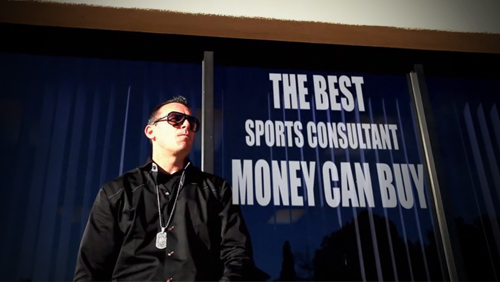 CNBC may have bitten off more than it could chew by giving Vegas handicapper Steve Stevens not only his own platform on TV, but his actual own show as the host of the network’s “Money Talks” reality series. Talk about taking a huge gamble on a guy with a shady past, CNBC is right front and center, subjecting itself from a lot of scrutiny with the hiring of a guy with a track record that’s checkered, at the very least.
CNBC may have bitten off more than it could chew by giving Vegas handicapper Steve Stevens not only his own platform on TV, but his actual own show as the host of the network’s “Money Talks” reality series. Talk about taking a huge gamble on a guy with a shady past, CNBC is right front and center, subjecting itself from a lot of scrutiny with the hiring of a guy with a track record that’s checkered, at the very least.
So who is Steve Stevens? Nobody knows a lot about him, apparently, and that’s when people take into consideration what certainly looks like bogus claims of winning 71.5 percent “to be exact” of his picks at his own handicapping service, VIP Sports. It also doesn’t paint a flowery picture that those who are familiar with Stevens remember him more for being convicted in 1999 in a telemarketing scam that milked investors of at least a quarter-of-a-million dollars.
Not exactly a bastion of virtue, this dude is.
News of CNBC’s decision to give him his own ‘docudrama’ raised a lot of eyebrows within the sportsbook industry after WagerMinds.com first came up with a report tying Stevens to his supposed real name, Darin Notaro. WagerMinds found out that the domain name of VIP Sports was registered to the Darin Notaro name. More worrisome is the other discovery surrounding Notaro, one that involves him getting sentenced to one year in prison back in 1999 for his involvement in a telemarketing operation that targeted and took advantage of elderly citizens from all over the country. Also, the renter of the office space of VIP Sports in Las Vegas is also Darin Notaro.
If the outlandish claims of winning more than 70 percent of his bets wasn’t a red flag on its own right, the kind of history attached to this man should’ve been enough for network executives to pull the plug on having any involvement with him.
CNBC did release a statement that looked hastily prepared in an effort to douse the bad press it’s been getting. “We are aware of Steve Stevens’ 1999 conviction, and while we are very clear in the press release that VIP Sports clients risk big dollars in the hopes that Stevens and his agents have the expertise to consistently deliver winners, viewers should tune in on September 10 at 10pm ET/PT to draw their own conclusions about VIP Sports,” the statement said.
“We are merely betting that viewers will be interested in the world of touts and handicappers and in no way endorse either Stevens’ picks or his business model.”
The obvious takeaway from this is if you’re not endorsing his business, then why did you give him a platform to advertise it on TV? That’s like saying you’re distancing yourself from his business practices and yet you’re banking on these same practices to get some traction for the show you’re building around him.
You can’t have your cake and eat it too, CNBC.
Noted handicappers within the industry, including Todd Fuhrman who now runs ToddsTake.com after a career as an oddsmaker for Caesars Palace, have all taken the network to task for its decision to hire Stevens.
“We’re seeing a disturbing trend start to emerge; the proliferation of docudramas, movies and articles that lead to sensationalizing dishonest personalities within the sports betting industry,” Fuhrman wrote in a blog post on Monday, before adding what may be one of the most damning indictments about Stevens: no one knows him in the Vegas bookmaking circles despite being promoted as Vegas fixture by the network.
That’s the conundrum CNBC is facing now after what’s looking like a case of not doing its homework on Steve Stevens.
And no, CNBC, no amount of press statements will get you out of this.